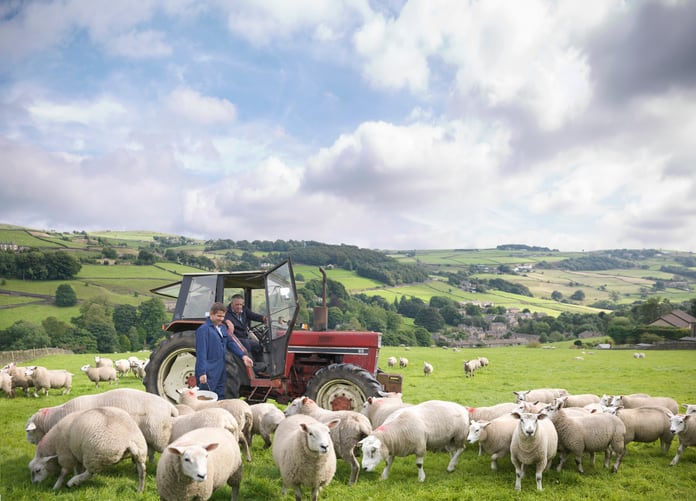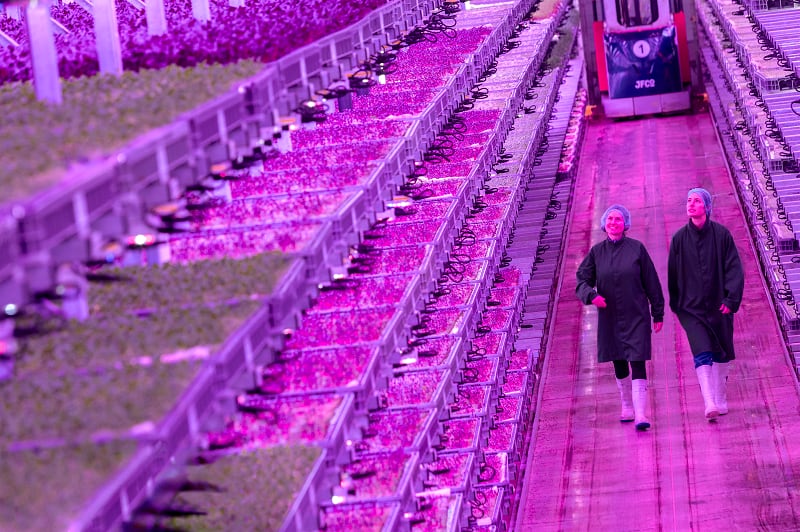Currently, government initiatives and grants support research and development (R&D) in sustainable agriculture. According to the United Kingdom Food Security Report 2021, research grants directed towards studying climate change impacts on agricultural yields and developing adaptation strategies have been spurring innovation in climate-resilient agriculture.
At the same time, venture capital (VC) funding is flowing into start-ups focusing on food waste reduction, precision agriculture, soil health monitoring, and alternative farming methods like agro-ecology and agro-forestry.
Fragmentation versus funding
However, while both public and private sectors are driving ag-tech investment in the UK, scaling up innovative solutions faces challenges due to factors such as high initial costs. One reason for this is market fragmentation, exacerbated by the abundance of small businesses that make up the UK’s ag-tech industry.
Speaking to AgTechNavigator, Agrimetrics’ Chief Scientific Officer and Professor of Applied Economics at the University of Reading, Richard Tiffin, said: “Our desire for a more sustainable planet has rightly captured the attention of a variety of industries, governments and sectors (but) all these areas are competing for funding to help them accelerate towards a more sustainable future — be it for research, machinery or technology.
“Identifying the most impactful solutions is paramount in securing funding, so the agtech sector needs to continue providing explicit evidence of how its solutions and research are helping to increase sustainability. Many of the challenges are at a scale that transcends the small businesses that make up the industry. Raising investment at the scale required for transformative change is therefore a challenge.”
He added that rising interest rates have affected investor confidence, making them more risk-averse and cooling the market as a result. This, in turn, had made it harder for start-ups to raise capital. On the upside, he said, collaborative platforms such as national innovation agency Innovate UK KTN offer valuable resources to help businesses scale by facilitating partnerships between innovative ideas and commercial organisations.
Strategic sustainability
There seems to be a more positive outlook for ag-tech sustainability in the UK, with the government having expressed commitment to investing in sustainable solutions through both its agtech and Net Zero strategies (the latter of which was published in 2022).
Tiffin said both strategies “have the same defining purpose — to lead the world in ending our contribution to climate change, while turning the mission into the greatest opportunity for jobs and prosperity since the industrial revolution”.
“Through the innovation in the ag-tech sector, we can identify ways in which we can almost double our food production using less land, energy and water. By ensuring data is easy to find, use and interpret, we will be able to digitise our food system, ensuring its security whilst protecting our planet.”
The aforementioned UK Food Security Report 2021 stated that the UK's sustainability and food security agenda prioritised efficient land use, biodiversity preservation and climate resilience, promoting initiatives like organic farming, no-till farming and agro-forestry to mitigate environmental degradation while ensuring long-term food security. By balancing production with environmental considerations, the UK aims to build a resilient and sustainable food system for future generations.
Additionally, the government has committed to sustainable development goals and initiatives like the Courtauld Commitment 2030, aiming to reduce food waste by 50% by 2030. Post-Brexit, each UK nation has the autonomy to set its own agricultural support schemes.
For instance, England's Department for Environment, Food and Rural Affairs (DEFRA) has introduced environmental land management schemes to subsidise and incentivise sustainable farming practices (such as conservation tillage and cover cropping) while maintaining productivity. Similarly, Scotland and Wales are developing policies to support sustainable production.
Additionally, initiatives like the Courtauld 2030 Water Ambition aim to improve water quality and availability through sustainable water management practices in agriculture.
Policies driving progress
Initiatives like the Waste and Resources Action Programme (WRAP) are leveraging technology to monitor and reduce food waste, including better labelling, storage guidance and improved food waste collections. Moreover, innovative solutions such as bio-based materials and redistribution of surplus food are being explored to minimise waste.
Tiffin said, “The UK government launched an agtech industrial strategy in 2013 to help Britain become a world leader in agricultural technology, innovation and sustainability. Since its formation, there has been continued investment in ag-tech to help us accelerate our transition to a more sustainable food system. This has been underpinned by increasing regulation around identifying and verifying the environmental impact of food production.
“This has led businesses and governments to invest in sustainable practices. In future, an important driver will be the focus on net zero. Agriculture is a significant contributor to greenhouse gas (GHG) emissions and there will be a focus on reducing these. As it is very important in managing land and land is an important sink for carbon, agriculture will play a crucial role on this side of the balance sheet.
“Another area which will have an important impact will be the increasing desire of consumers to eat healthy food that is sustainably produced. The resulting changes in diet will feed back into which food is produced and how.”
In addition, Prime Minister Rishi Sunak's government announced a new science initiative to combine work on developing climate-resilient crops at the Global Food Security Summit in London in November last year. A new virtual science hub will be led by the Consortium of International Agricultural Research Centers (CGIAR) and connect UK scientists with research initiatives to develop crops that can better resist diseases and withstand the impacts of climate change.
The future of farming
There remain difficulties in terms of scaling up innovative agtech solutions due to factors such as market fragmentation, high initial investment costs and resistance to change. Furthermore, limited access to advanced agricultural infrastructure and technologies in rural areas hinders the efficient implementation of soil health management practices and climate-smart agriculture techniques.
While there is momentum towards adopting such practices, other factors like economic viability and land management complexities hinder widespread implementation. Additionally, educating and incentivising farmers to transition to sustainable methods remains a challenge, requiring comprehensive support mechanisms and infrastructure.
Despite these challenges, however, there are promising upcoming agtech innovations in the UK. These include technological advancements in soil monitoring devices and sensors that enable precise tracking of soil health indicators like nitrogen and phosphorus levels, aiding farmers in optimising fertilisation strategies.
Additionally, precision agriculture techniques like variable rate fertilisation, drones, sensors, irrigation systems and GPS-guided machinery can help to address soil degradation and erosion by optimising resource usage and minimising environmental impacts.
At the same time, the UK can look forward to advancements in vertical farming techniques to increase crop yield in controlled environments, thereby reducing land use and water consumption, as well as R&D in gene editing technologies for crops to enhance resilience to climate change and pests.
Tiffin said: “The speed and sophistication of innovation in agtech has increased dramatically over the last 10 years. The focus has been on raising productivity but doing so in ways that are more sustainable, and respectful of the environment and animal welfare. For example, we have seen the advent of integrated pest management, a focus on soil management and precision nutrition for livestock.
“Data has become integral in accelerating agtech solutions and our transition to a more sustainable food system. Understanding what is happening on-farm at scale allows us to monitor, report and verify the impact it has on the environment. Utilising sophisticated satellite imagery, on-farm data collection and cutting-edge development and data science means we will be able measure the environmental impact of production with greater accuracy and speed, so we can begin to map whole supply chains.
“These trends are set to continue and open the possibility of, for example, management of pest and disease risk at the landscape scale. It is likely also that the emphasis on net zero will lead to innovations in this area, such as to support farmers in improving the sequestration of soil carbon."



